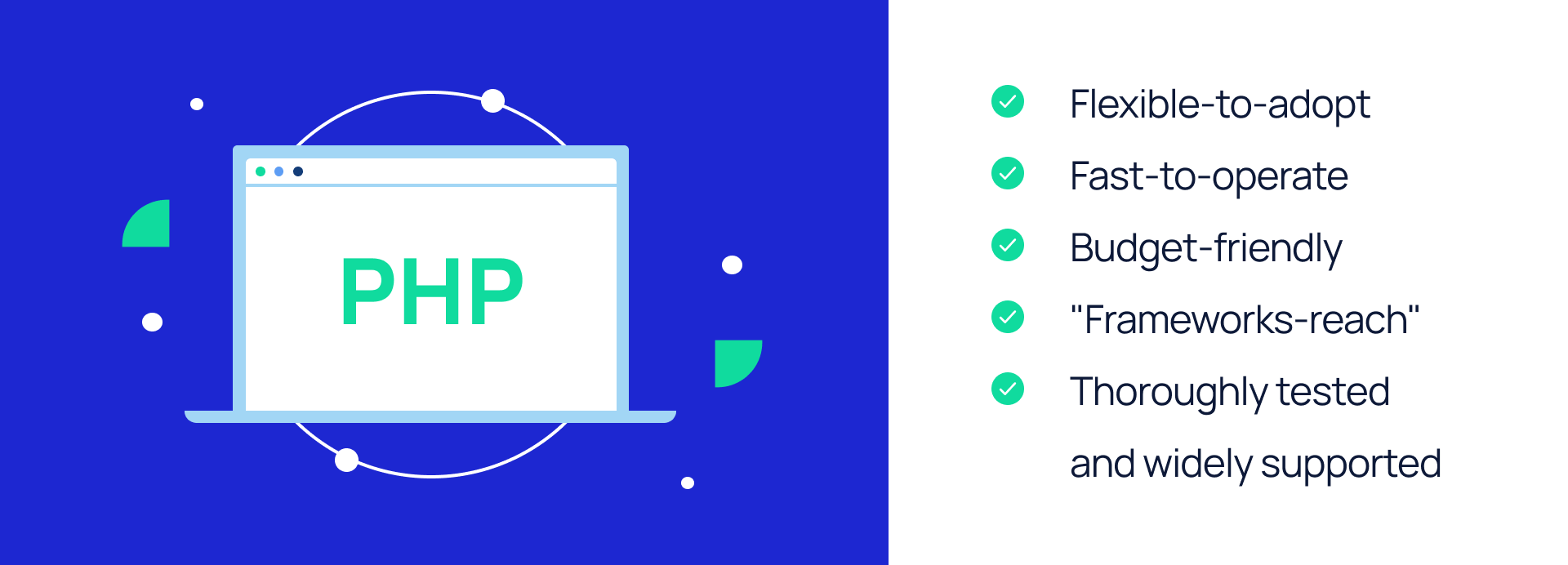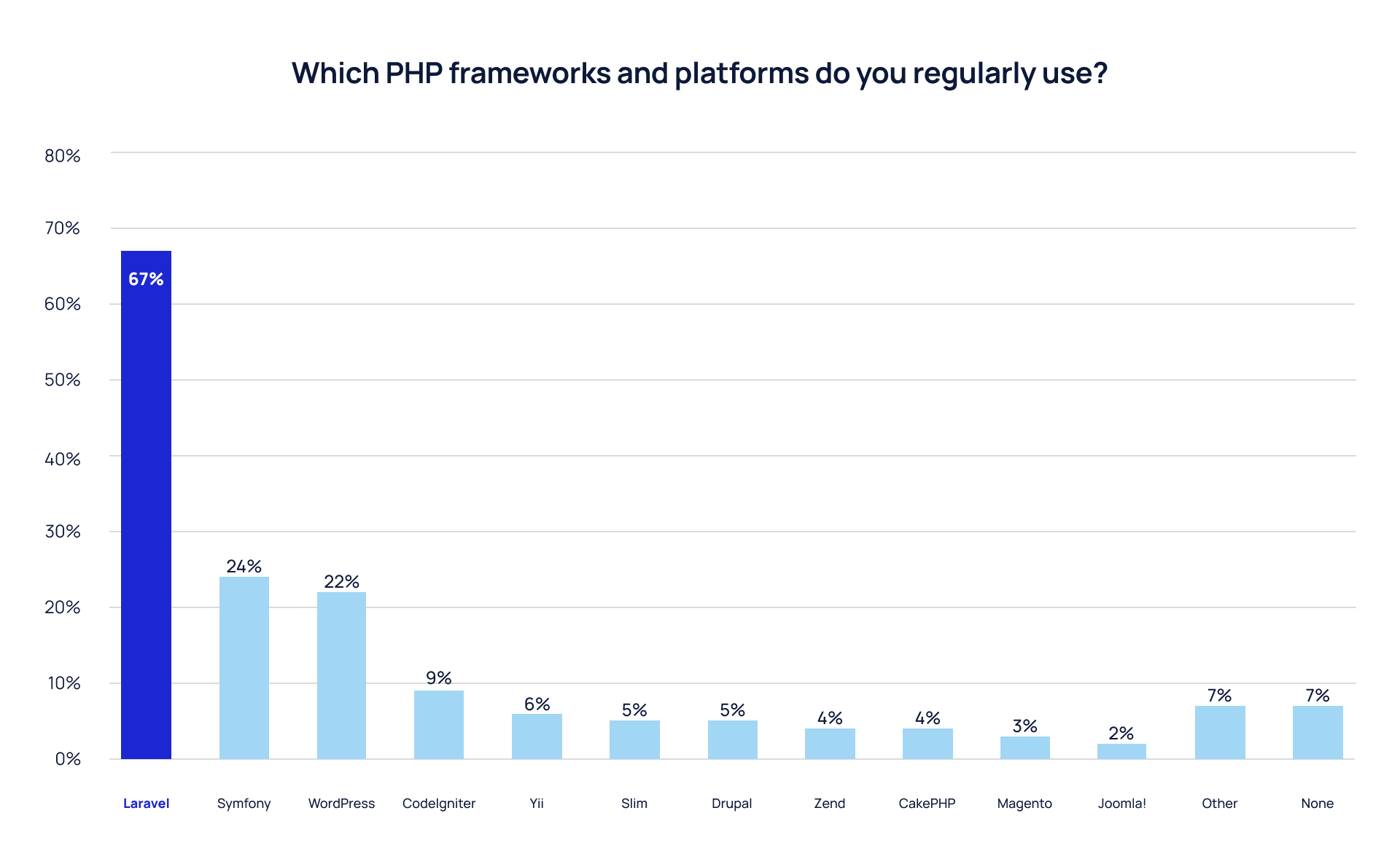Is PHP still alive?

Is PHP dead, or can it be a worthy choice for developing interactive web solutions? Keep reading the article to come up with an informed decision.
With the emergence of new technologies, one would not turn his or her hand to consider a programming language that is more than 25 years old for a digital medical solution. In a world of crazy tech advancement, the old is often inferior to the new. Or is it not?
Surely you've come across the saying that PHP is already "dead". But before you give up on it, I suggest looking at it from a perspective that reflects its significant improvements over the years and restores PHP's former glory.
Is PHP still so vital to web development? Let's go over everything in order.
PHP: a look from inside
According to an annual developer survey by Stack Overflow, PHP has fallen in the ranking from 6th in 2017 [1] to 8th in 2020 [2]. But at the same time, the programming language is leveraged by 78% of websites [3]. WordPress, Drupal, Joomla, Slack, Facebook, Etsy, MailChimp, and many other sites are PHP-embedded.

The question is more about what purpose your business is pursuing. For example, if you're sticking to a prompt development-to-release cycle of your web solution, PHP might be considered a key player among its competition.
What is PHP from a technical standpoint?
PHP (Hypertext Preprocessor) is a general-purpose server-side scripting language used mainly to develop dynamic custom websites filled with interactivity. It can be embedded in HTML, facilitating the addition of functionalities with no external files for data to be involved. Moreover, PHP is flexible enough regarding a wide range of databases (MySQL, ODBC, SQLite, etc.), seamlessly connecting with them.
It is worth mentioning its open-source and objective-oriented nature. Thus, PHP can be freely downloaded and used to build even complex reusable web pages.
How PHP is beneficial for your business: 5 features to look out for
- Flexible-to-adopt
The flexibility concerning databases has already been mentioned. In addition, the language is compatible with many сommonly used servers (Apache, Microsoft IIS, etc.), enabling it to be seamlessly and cost-efficiently deployed to a variety of systems.
PHP is supported by any operating system so that your healthcare solution developed on one operating system can reliably function on another.
- Fast-to-operate
PHP scripts operate faster than scripts based on other languages. In addition, the language has its memory, reducing the workload on the server and increasing request processing speed — the performance of your website only stands to gain from it.
Also, PHP is well optimized and embedded with predefined functions that simplify and speed up the process of web development.
- Budget-friendly
It is considered a reasonably low-cost language.
First of all, it is worth paying tribute to the previously mentioned open-source nature: no licenses and additional payments. Second, its multi-platform capability and flexible technological integration save money and time, the latter being more valuable than gold these days.
As a result, you have a good chance to leave your competitors in the dust, speeding time-to-market without breaking your wallet.
- "Frameworks-reach"
PHP frameworks make code libraries available for frequently used functions and thus streamline the coding process: eliminating the need for developers to code from scratch.
A great variety of PHP-powered frameworks, the most popular of which are Symfony and Laravel [4], provides medical businesses with an opportunity for time-efficient and straightforward web apps engineering.
- Thoroughly tested and widely supported
PHP can be considered a "tried-and-true" language that withstood the time trial. So it is not hard to find more technical information about its exploitation in tutorials, guides, discussions, and documentation.
The "longevity" of the language allowed it to be tested in all real-life environments, fixing the principal vulnerabilities and making it less prone to cyberattacks. As a result, we now have a more bug-free, reliable, and trustworthy programming language in developers' eyes.
Thanks to powerful community support that keeps the language from "gathering dust", PHP continues to evolve, delighting its supporters with constant updates and new version releases, the last of which came out in 2020 (PHP 8), making modern PHP faster, more optimized, and with higher performance regardless of PHP 5.H2: PHP vs. other programming languages.

There is no perfect programming language. Of course, you know that. But each has its own strengths and shortcomings. Since PHP is the main topic of our today's discussion, let's compare it with other programming language giants:
JavaScript
JS has been around for about as long as PHP, and it remains one of the most common programming languages today. Both languages have a large community and are versatile enough. Still, while JavaScript offers full-stack development, PHP remains time-effective in learning and budget-efficient in further maintenance.
Ruby
Ruby is also an open-source language used in Ruby on Rails, a popular web development framework. However, despite its powerful performance, it requires more effort to master than PHP. Besides, It doesn't provide the same extensive community support as PHP.
Python
Python boasts simplicity and flexibility in its use, but it is still significantly out of step with PHP for use in speedy web development. Despite the same considerable number of libraries and frameworks, for now, it remains far behind PHP in high-level database integration and support.

The bottom line
The widespread use of PHP across the web proves its vitality. At the same time, the extensive community support will keep the language afloat for a long time to come, making it one of the best options for web development: the digital presence of your medical business.
The abundance of options does not facilitate the selection. On the contrary, the choice among a wide variety of technology stacks for medical application development is doubly hard — easy-to-maintenance, scalability, and security are at stake.
PHP can become a worthy option regardless of its facilitated syntax and rapid onboarding to help you deliver a solution speedily and seamlessly. To be more precise, it is not the language itself that would help, but a team of experienced developers you can connect with — just drop us a line.
References:
- https://insights.stackoverflow.com/survey/2017#technology
- https://insights.stackoverflow.com/survey/2020#technology-programming-scripting-and-markup-languages-all-respondents
- https://w3techs.com/technologies/details/pl-php
- https://dev.to/dannyviiprus/php-8-new-features-comparison-with-older-versions-1ljj
- https://phptherightway.com/
- https://www.w3schools.com/php/
- https://platform.sh/guides/exploringphp80.pdf
 Medical Content Creation
Medical Content Creation
 Digital Product Development
Digital Product Development
 Growth Marketing
Growth Marketing
